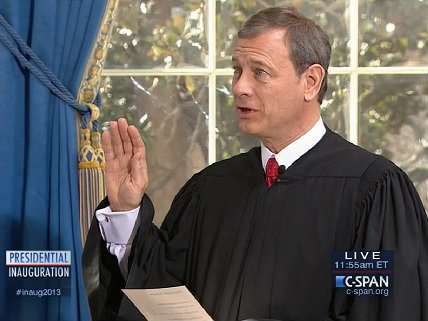'Get a Warrant': John Roberts Gives the Cops a Benchslap in Riley v. California

The Fourth Amendment protects our "persons, houses, papers, and effects, against unreasonable searches and seizures." Today, in the case of Riley v. California, the U.S. Supreme Court ruled unanimously that this constitutional protection extends to the cellphones we carry around with us, even when the police have placed us under arrest and would like to search those cellphones without a warrant in the hopes of finding some incriminating evidence. "Our answer to the question of what police must do before searching a cell phone seized incident to an arrest is accordingly simple," declared Chief Justice John Roberts, "get a warrant."
It's a welcome decision and a well-deserved victory for digital privacy. It's also a stinging benchslap for the Obama administration and the other parties who lined up in favor of aggressive law enforcement tactics in this case. For example, according to one legal filing submitted by the Obama administration, "Although cell phones can contain a great deal of personal information, so can many other items that officers have long had authority to search, and the search of a cell phone is no more intrusive than other actions that the police may take once a person has been lawfully arrested." Translation: The Fourth Amendment should not apply.
But the problem with that boundless view of government power is that it would give the police free rein to access the emails, texts, photos, videos, and GPS tracking data of each and every person that has been placed under arrest, including those persons arrested for minor crimes such as jaywalking. What's more, as the chief justice observed in his opinion, "a cell phone search would typically expose to the government far more than the most exhaustive search of a house," since unprecedented amounts of private information is now available at the touch of a cellphone screen or button.
As for the government's claim that a warrantless cellphone search is "materially indistinguishable" from the sort of warrantless physical searches that the police are allowed to do in order to locate hidden weapons, Roberts was equally dismissive. "That is like saying a ride on horseback is materially indistinguishable from a flight to the moon," he quipped. "Both are ways of getting from point A to point B, but little else justifies lumping them together."
The whole point of the Fourth Amendment is to safeguard the citizenry against government snooping, meddling, and overreaching. Today, the Supreme Court gave the Fourth Amendment its due and put it to precisely that use in Riley v. California.


Show Comments (19)